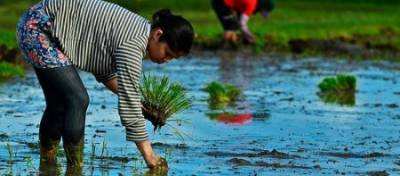THIRUVANANTHAPURAM, 2 July 2025: In a landmark step toward sustainable and climate-resilient agriculture, the International Rice Research Institute (IRRI) on Tuesday signed a memorandum of understanding with the Government of Kerala to advance low-emission rice farming across the state.
The agreement, formalized on July 2, 2025, will support the Kerala Climate Resilient Agri-Value Chain Modernization Project (KERA), funded by the World Bank. The program aims to co-develop and scale climate-smart, low-emission agricultural practices across 22,000 hectares, directly benefiting over 45,000 farmers.
At its core, the KERA project will focus on piloting and scaling Low Emission Packages (LEPs), along with digital water management systems. These practices are designed to reduce greenhouse gas emissions while sustaining rice yields and farmer incomes, officials said.
Key partners include Kerala Agricultural University, the Centre for Water Resources Development and Management, Padasekhara Samitis, and local water user associations. IRRI will lead technical development, monitoring frameworks, and capacity-building efforts.
The pilot zones will focus on rice-growing regions of Palakkad and Thrissur, which are critical to Kerala’s food security but also significant methane emission hotspots due to waterlogged farming practices. The program plans to introduce alternate wetting and drying (AWD) irrigation methods supported by digital monitoring tools to cut water use and emissions.
“The KERA initiative represents a shift from conventional rice production to climate-smart models that serve both farmers and the environment,” said Dr. Prakashan Chellattan Vettill, IRRI Senior Economist and Project Lead.
Kerala’s Principal Secretary and Project Director for KERA, Dr. B. Ashok, described the partnership as a “transformative” step that will position Kerala as a hub for climate innovation in smallholder rice systems.
Beyond the technical interventions, the project will also explore ways for farmers to participate in carbon markets through verified payment-for-ecosystem services models, according to IRRI’s senior team.
Officials added that engaging youth, women, and cooperatives is central to the program’s inclusive strategy, ensuring that climate action in agriculture supports livelihoods, equity, and long-term sustainability.
The MoU signing underscores Kerala’s ambition to lead India’s climate-smart agricultural transition, leveraging technology, policy support, and grassroots participation to create a scalable, replicable model for other rice-producing states.
Image credit: ccafs.cgiar.org




















